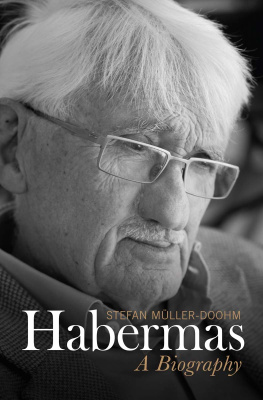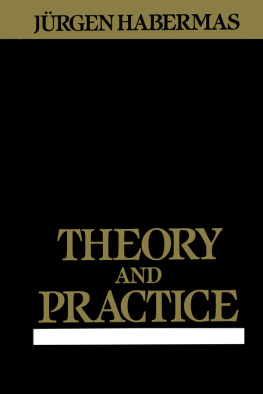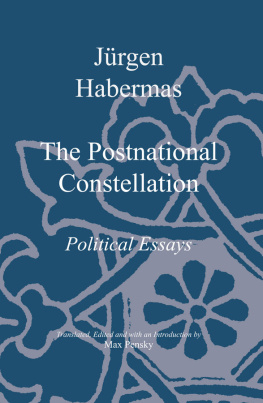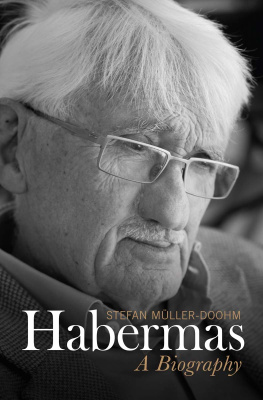Contents
Guide
Pages

For my wife Heidlind
Habermas
A Biography
Stefan Mller-Doohm
Translated by Daniel Steuer
polity
First published in German as Jrgen Habermas: Eine Biographie, Suhrkamp Verlag, Berlin, 2014
This English edition Polity Press, 2016
The translation of this work was supported by a grant from the Goethe Institut, which is funded by the German Ministry of Foreign Affairs.

Polity Press
65 Bridge Street
Cambridge CB2 1UR, UK
Polity Press
350 Main Street
Malden, MA 02148, USA
All rights reserved. Except for the quotation of short passages for the purpose of criticism and review, no part of this publication may be reproduced, stored in a retrieval system, or transmitted, in any form or by any means, electronic, mechanical, photocopying, recording or otherwise, without the prior permission of the publisher.
ISBN: 978-0-7456-8910-4
A catalogue record for this book is available from the British Library.
Library of Congress Cataloging-in-Publication Data
Names: Mller-Doohm, Stefan.
Title: Habermas : a biography / Stefan Mller-Doohm.
Other titles: J?urgen Habermas. English
Description: Malden, MA : Polity Press, 2016. | Includes bibliographical references and index.
Identifiers: LCCN 2015041865| ISBN 9780745689067 (hardback : alk. paper) | ISBN 9780745689081 (pbk. : alk. paper)
Subjects: LCSH: Habermas, J?urgen. | Philosophers--Germany--Biography. | Sociologists--Germany--Biography.
Classification: LCC B3258.H324 M8413 2016 | DDC 193 [B] --dc23 LC record available at https://lccn.loc.gov/2015041865
The publisher has used its best endeavours to ensure that the URLs for external websites referred to in this book are correct and active at the time of going to press. However, the publisher has no responsibility for the websites and can make no guarantee that a site will remain live or that the content is or will remain appropriate.
Every effort has been made to trace all copyright holders, but if any have been inadvertently overlooked the publisher will be pleased to include any necessary credits in any subsequent reprint or edition.
For further information on Polity, visit our website: politybooks.com
Preface
No one has the right to behave towards me as if he knew me.
Robert Walser
Many labels have been attached to Jrgen Habermas over the years: advocate of modernity and master of communication, the public conscience of political culture and the Hegel of the Federal Republic, the power at the Main, That this list of references to Habermas in the media some of which are less than flattering could easily be extended demonstrates just how newsworthy he is considered to be; his activities as an academic and as a commentator on contemporary developments certainly do not suffer from a lack of public attention. Why then, in light of all this, write a biography of this man, especially one that neither intends to place Jrgen Habermas, the (somewhat unknown) private person, at its centre nor aims to erect a monument to a master thinker on the occasion of his eighty-fifth birthday? After all, we live in times which, according to Habermas himself, need neither heroes nor anti-heroes. What has driven me, as a sociologist, into the arms of biographical research, and has led me to try my hand at writing a biography once again, is the conviction that the visible traces of a life such as that of Jrgen Habermas are particularly suited for a study of what was, in a certain sense, the central concern of the sociological perspective from the very beginning: namely, the dialectic between individual and society. How is it that someone in interaction with others becomes an individual, and that individuals thus become capable of forging their own unique and specific biographies, but only through a process of engagement with and within their times?
It is admittedly a great temptation to present this particular biography as a story of exceptional success. However, not only would that amount to a misleading attenuation of some of the darker strands in this lifes biography (some of which are well known), it would also contradict its, at least on the face of it, conventional bourgeois trajectory. In conversations, Habermas has repeatedly emphasized that the more or less linear course his life has taken fitted into the parameters of the historical circumstances of his generation and fell within the possibilities offered to this generations members in terms of realizing their personal ambitions under conditions of a regained freedom. If we were to take this self-characterization at face value, we might conclude that Habermass vita proceeded from phase to phase in the even steps of a standard biography. And it is true that it was characterized by a continuity based on a great degree of outward security: childhood, schooling, student days, marriage, children, profession, etc. As in every life, there were of course ruptures, setbacks and turning points. What, then, makes this existence unique? Where lies the unusual within the usual?
Of course, it is obvious what a remarkable career Habermas has had. With his monographs and collected essays, which have been translated into more than forty languages, he has established a tremendous national and international reputation as a scholar, and as an author he has found a responsive audience even beyond the academic world. With this in mind, one might conclude that Habermass biography is simply the story of his published work. However, his life is so fascinating precisely because it amounts to more than just a stack of learned books: here is someone who continually left the protective space of academia in order to assume the role of a participant in controversial debates and, in this way, sought to influence the development of the national mentality in his home country. And, we may add, he was successful in this. In that sense, the retracing of the events that formed Habermass life provides only the basso ostinato, so to speak, for what is actually the main interest of this biography: namely, to present a portrait of the entanglement of his main profession with his second occupation, of the interrelations between the development of a philosophers thought and the interventions of a public intellectual, as seen against the backdrop of contemporary events.
No matter where a biographer may place the emphases, he is always guilty of a certain presumption; this is simply to be acknowledged. Biographical research and writing always involve a certain indiscretion one may even speak of biographical investigations as hostile acts. A biographer cannot but make a private life the object of his curious gaze. Even worse: he roams around in the life of his protagonist and assumes the authority to decide which events will be looked at in detail and which will only be touched upon, or which will be considered so insignificant as to be left out altogether. Thus, he has to decide which moments of a life will be omitted, which connections will be left out, and if and when gaps will be filled by means of applying the method of exact fantasy (Theodor W. Adorno).
At such moments, a biographer is not that far removed from the novelist. He is as much in the dark as to the significance of the insights gained while reviewing the course of a life as the protagonist in Max Frischs Gantenbein What really happened? In order to capture the ruptures and contradictions in a lifes history, a biographer adopts the stance of Frischs protagonist, who feigns blindness: I imagine. And then the search for the story of the story begins a search in which, as compared to the novelist, the biographer may have the advantage that he can refer to a body of sources that guides his narration.













